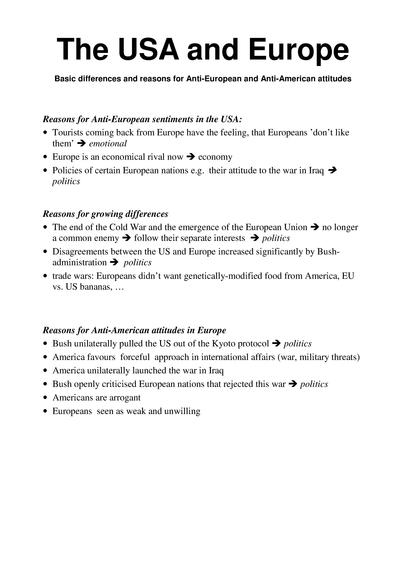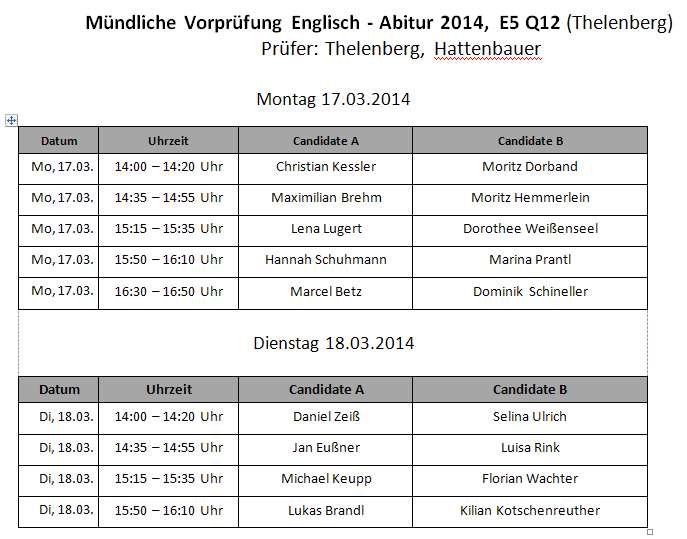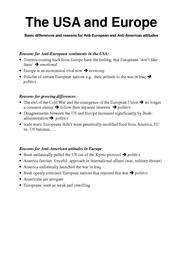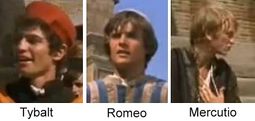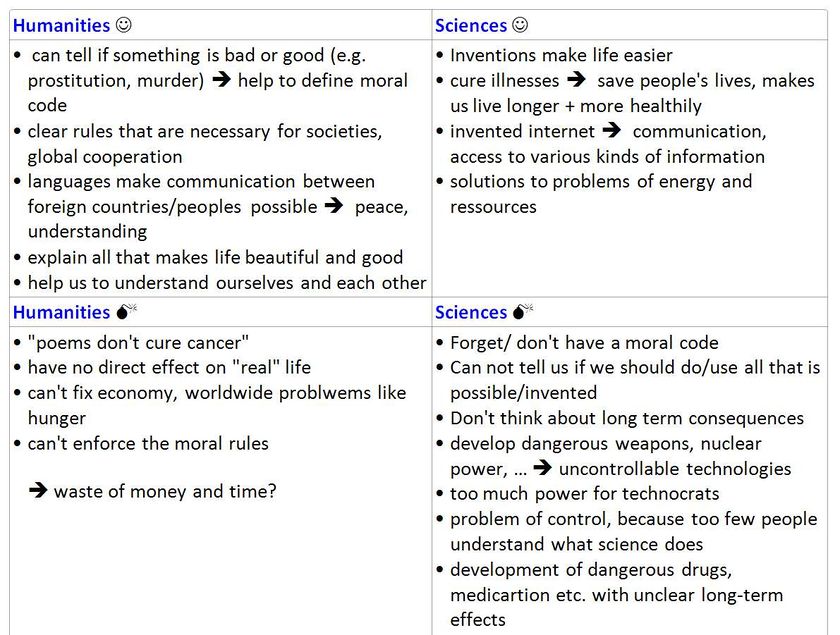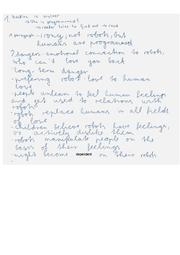Thelenberg 2013 14
Colloquium
For the materials on the topic see HERE
Homework
Analyse this CARTOON!
Be prepared to give a free, short talk on: The difficult relations between the USA and Europe:
- Klick on the document below!
Read the following passages from Act V, Scene III. Make sure you read scene III!
- Romeo, who was banished from Verona, heard that Juliet is dead, buys a poison and hurries to her grave. He finds her lying in the vault:
- ll. 101 - 120
- Juliet, who just seemed dead (a death-like sleep caused by a potion that she took to escape from the arranged marriage with count Paris) has woken up. She finds Romeo lying there lifeless:
- ll. 166 - 176
- The night watch, the Prince and the families have been alarmed and have hastened to the grave. The Prince tries to find out why Romeo, Juliet and Count Paris are all dead and lying in the vault:
- ll. 297-322
- What is your impression of the ending? (How) Do you like it?
- What is the "message" that the audience take home with them?
To write a good comment/ essay you need
- A clear understanding of the topic/question (Mark key phrases and look up terms if you are not sure!)
- A good collection of ideas and examples (mindmap, list, ... → use colours or numbers to structure your collection; write it in English!)
- A quick and effective introduction (See here)!
- Well-constructed and well-linked arguments/paragraphs (thesis/introduction - supporting point - example - conclusion) (See here)
- 5. Vocabulary! → e.g. vocab sheet on plastic surgery →
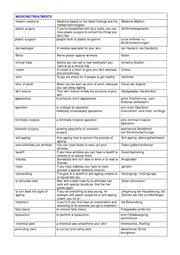
Work through steps 1 to 3 for the following topic!
Obesity is much more than a problem of people being overweight! It is a national crisis that the United states is responsible for and must solve! Comment on this thesis!
Now write out the first paragraph/argumnent!
- Look at this cartoon and prepare an oral presentation including a description and analysis! Cf.
- See here for help on analysing cartoons!
Plastic surgery performed on teens in the USA:
- What motives, views and attitudes for plastic surgery are there?
- What are the effects and problems of plastic surgery covered by this video clip?
Prepare a three-minute-talk:
Short introduction, clear structure, effective phrases!
- What are the effects on our society, if Dr Verma is right with her opinion on the cause of the differences in male and female brain structure? What does it imply if she is wrong - and society and education are the causes?
- Find examples for both alternatives and explain what you think to be right!
Analyse and comment on the cartoon you find here!
.
ORAL TEST - "Vorprüfung"
Dates
- RAUM C1.012
Test Procedure
1. Cartoon
Candidate A:
- Preparation 1.30 min
- Description + Analysis 3.00 min
- Candidate B: Additions 1.00 min
Candidate B:
- Preparation 1.30 Min.
- Description + Analysis 3.00 min
- Candidate A: Additions 1.00 min
2. Role Play
- Preparation (quietly with role card) 3.00 min
- Role Play 6.00 min
.
Topics
All materials can be found in our Wiki or in the book or following external links!
1. Welfare Debate ⇒ Course-WIKI English 11: 5.3 - 5.4
2. Environment (all dates) ⇒ our blog (Global Warming, Energy (Saving and using it effectively), Rainforests
- Dos and Don'ts
- Global Warming, Energy (Saving and using it effectively), Rainforests (BLOG!!!)
3. Mixed society: ⇒ Course-WIKI English 11: 7.1 - 7.2, 7.5 + worksheet on multiculturalism/racism (handwritten)
- different concepts of mixed societies
- multiculturalism: facts, book p. 51, pros and cons
- immigration: typical lives, problems, pros and cons
4. Globalization ⇒ Course-WIKI English 11: 9.1 - 9.4
- Definition and Key Facts
- Phases/Development
- Pros and Cons
- Internet
- Cultural effects
5. The Hobbit – A Fantasy Novel classic by J.R.R. Tolkien
6. Science and Technology: Robots
7. Improving yourself: Plastic Surgery?
8. Obesity in the USA
Basic Skills & Information
- Information on homework and oral grades
- Reading and Marking technique - SQ3R Method A useful method to read, mark and annotate texts.
- A good speech/speaker ...
- Aspects of Analysing texts (style, irony, tone/mood, ...)
- Answering questions on the text
- Starting an Essay/Comment
- Starting a paragraph
- Building an Argument
- Mediation
- Translation (E→G)
- Characterization
- Diary
- Writing an interview
- Working with Cartoons
The USA and Europe
The USA and Europe - increasingly difficult relations?
The difficult relations between the USA and Europe:
William Shakespeare: Romeo and Juliet
The Prologue
Prologue to the most lamentable story of Romeo and Juliet
Two households both alike in dignity,
In fair Verona, where we lay our scene,
From ancient grudge break to new mutiny,
Where civil blood makes civil hands unclean.
From forth the fatal loins of these two foes
A pair of star-cross’d lovers take their life;
Whose misadventur’d piteous overthrows
Doth with their death bury their parents’ strife.
The fearful passage of their death-mark’d love
And the continuance of their parents’ rage,
Which, but their children’s end, nought could remove,
Is now the two hours’ traffic of our stage;
The which, if you with patient ears attend,
What here shall miss, our toil shall strive to mend.
For original AND modern language version see here.
QUESTIONS:
- What is the function of this prologue for the audience?
- What can you say about the language and structure (rhyme ... metre) of these lines (It's a poem with 14 lines .... famous pattern!)?
- Learn lines 1 - 8 by heart + practice reciting them .....!
Version from a 1996 Movie:
The Sonett
A sonnet is a poetic form which originated in Italy. By the thirteenth century it signified a poem of fourteen lines that follows a strict rhyme scheme and specific structure. One of the best-known sonnet writers is William Shakespeare, who wrote 154 of them (not including those that appear in his plays).
A Shakespearean/typical English sonnet consists of fourteen lines written in iambic pentameter, a pattern in which an unstressed syllable is followed by a stressed syllable five times. The rhyme scheme in a Shakespearean sonnet is
The last two lines are a rhyming couplet. The couplet often includes the point/turning point of the poem or sums up the content.
- a-b-a-b
- c-d-c-d
- e-f-e-f
- g-g
Tragedy
Tragedy: Drama of a serious and high-standing character that usually describes the development of a conflict between the protagonist and a superior force (such as destiny, circumstance, or society, the laws, in which the character often must choose between two alternatives, which both lead to his destruction. In a tragedy there is typically a sorrowful or disastrous conclusion.
Good Example:
Antigone by Sophocles( around 441 BC.) In this tragedy Antigone has to struggle against King Creon, her uncle. Her two brothers, Eteocles and Polynices were to reign over Thebes taking turns, but fighting over power, the two brothers kill each other. After this event, Creon declares that, as punishment, Polynices' body (he is quite correctly seen as a traitor) must be left on the plain outside the city to rot and be eaten by animals. Eteocles, on the other hand, is buried as tradition demands. Antigone determines this to be unjust, immoral and against the laws of the gods, and buries her brother regardless of Creon's law. Creon's guards discover this and capture her. Antigone is brought before him, where she declares that she broke his law, and agrees that the King's laws must be obeyed in a state, but she chose to break it, stressing the superiority of 'divine law' to that made by man.
Sophocles' Antigone ends in disaster, with Antigone hanging herself (she doesn't want to be stoned to death, or die slowly in the cave she has been put in), and Creon's son Hæmon, who loved and was engaged to Antigone, killing himself after finding her body. Queen Eurydice, wife of King Creon (who finally decides he should not kill Antigone – but comes too late to save her), also kills herself due to seeing such actions allowed by her husband.
Apply this concept of tragedy to Romeo and his involvement in the deaths of Mercutio and Tybalt!
Read the text here, lines 55-210 and watch the video!
Romeo and Mercutio are Montagues, Juliet and Tybalt (her cousin) are Capulets.
The Cult of Youth: Plastic Surgery and Gyms ...
Plastic surgery performed on teens in the USA:
- What motives, views and attitudes for plastic surgery are there?
- What are the effects and problems of plastic surgery covered by this video clip?
Reasons for plastic surgery
Vocabulary
Vocab sheet on plastic surgery / youth cult:
Obesity
Film
- Write out facts about and reasons for obesity from the video! Take readable notes!
- * Pupils whose last names begin with letters from A - L do this for minutes 0:00 - 3:55!
- * * Pupils whose last names begin with letters from M - Z do this for minutes 3:55 - 7:55)
Summary of facts in the film
USA not winning battle against obesity
- 150 billion $ for treatment of related illnesses
- studies: 7% of middle school children severely obese
- obesity rate up in 28 states
- in 2/3rd of states more than 25 % are obese
Theories: What in the food makes us fat
- single ingredient theory: fructose
- low cost sweetener corn fructose, more in many foods than you expect
- sugar messes with brain + makes you feel hungry
- level of obesity rose with introduction of fructose: cheap + everywhere (yoghurts, soft drinks)
- many ingredients, that don't belong into food
- packaged/process food is too sweet, fat, salty
- misleading quality marks …. suggest valuable ingredients
- advertising for/presentation of food
- smart choices label: less sugar, fat ….?
- how do we eat: without thinking: people don't know how many calories they consume, huge portions
Solutions:
- 2 week long weight loss camp: how to move and how to eat
- school pushes fruits+ vegetables, limits portion sizes, puts BMI on report card
- local restaurants change menue
- kids walk to school instead of going by school-bus
- explain to people that obesity shortens life + reduces quality of life
- portion control ==> help of nutritionist, learn to know what / how much you eat
Science
Science vs. Humanities
Science vs. Humanities - Text-Summary
Summary for Text "Science vs. Humanities"
- only scientists make real contributions to humanity!
- division into sciences and humanities makes solving world's problems difficult
- many educated people have no understanding of basic concepts and the projects in modern physics
- contrasting positions:
- humanities give us understanding of history → learn from history → culture VS.
- poetry doesn't save lives etc. like e.g. medicine
- → true that humanities can't solve e.g. medical or technical problems, but they provide what science can't do: answers to moral/ethical questions (not necessarily in shape of organized religion!)
- philiosophy in the original sense included looking for answers to all questions (incl. natural. philosophy)
- science and humanities give different answers to different questions, but both help us master our lives
Robots
| Pro | Con |
|
|
Numbers and uses of robots are increasing in the military sector and in households
Advantages of using robots:
Military robots:
- advantage in war
- unlimited supply of robots
- fewer in human lives lost
- more effective use of weapons than human soldiers
- arms race in robotics has begun → US a must keep advantage in this field
- Machines: no negative or strong emotions
- better at quick, rational decision-making
- more rational/calm and ethical decisions (no anger, revenge) is
Household robots
- save time/work/do boring and dirty jobs ⇒ useful helpers
- can be used to control home/house remotely
Problems/dangers of using robots:
Military robots
- Sufficient ability to identify proper targets/combatants?
- right to decide about acceptable human collateral damage?
- inability to show mercy/give pardon
- who is responsible if robot kills wrongly
- technical ability to kill and destroy is more easily developed than more role/ethical control-mechanisms
- dangerous, 100% obedient tool in the hands of dictators etc.
Household robots if hacked, they could be illegally used to
- control our homes
- spy on us
- attack us
Text: Programmed for Love
- The original text on the problematic relations between people and robots can be read here!
- Answers to questions 1 and 2 on Worksheet(click several times!):
Answers to questions 1 and 3 on worksheet:
1. Headline makes reader wonder:
- programmed (technology) ⇐⇒ love (emotion)?
- programmed: no choice, no free will ...
- who is programmed for love? (Assumption: a robot/computer/machine?)
- Reader curious to answer the question/find connection between technology - emotion
After reading that human beings, and not machines, here are programmed in such a way that they fall in love with robots ⇒ surprise ⇒ interest ... How can that be - "to have" to love a robot due to being programmed to do so?
3. Change in author's attitude to robots:
first/before
- enthusiastic about new technologies (MIT)
- believed in benefits of creating alternative identities in virtual life
- studied human interactions with computers
then / after (encounter in which she realized she wanted the robot's attention, reacted to simple signals of communication) against man - robot relations on an emotional basis as:
- Robots can malfunction
- afraid that machines play role that only humans should play
- it damages our sense of humanity
- robots don't love you back, even if the promise
- people give up establishing and having relationships with real people
- Outlook: Will robots change us?
.
The Hobbit
The original idea was that of a "reading-diary". That meant
- keeping a simple log-/scrapbook while reading the novel
- stopping from time (at least after each chapter) to time to think about what you have read!
- thinking about questions like: "Is there anything that puzzles you?" and noting down questions or striking quotations!
- asking yourself if you like or dislike a character + what makes you feel so?
- making notes that you can add to (e.g. one page per character for characterization)!
The scrap book that you have to hand in is part of the coursework (marked!)
These are the minimum reqirements, that is the questions you need to have readable and reasonable NOTES on:
Chapters 1 and 2:
- Characterize Bilbo and one other character (round or flat, relation to each other?)!
- What kind of story and hero do you expect at the end of chapter one?
- Compare your impressions of Bilbo and the dwarves at the end of chapter II with those at the end of chapter I.
Chapters 4 + 5:
- p. 65-70: What rhetorical devices (e.g. symbols, style) and narrative tricks are used to create the special mood, tension and expectations?
- Collect all important information about goblins/orks in a "what travellers ought to know about goblins" profile!
- What are the similarities and differences between Bilbo and Gollum? (NOTES)
Chapters 7 + 8:
- Characterize Beorn!
- How does the mood / atmosphere develop from page 158 – 162 … How is this effect achieved?
- Explain how chapter 8 reveals Bilbo's heroic qualities!
- Compare the different dwarves' (Bombur - Thorin - Kili&Fili) and Bilbo's roles/function in the story in chapter 8! Who are the flat and who the round characters?
Chapters 9 + 10:
Compare the endings of chapters 8, 9 and ten.
Chapters 11 + 12:
- Characterize Smaug (NOTES!)
Chapters 14 + 15:
- Characterize Bard
- How can Thorin's reaction to Bard's requests be explained?
Chapters 16 + 17:
- Bilbo fully turns into a modern, everyman anti-hero - very different from an epic hero like Thorin.
- Compare the two types of heroes!
- How do they feel abot the treasure / fighting?
- What does "honour" mean for them?
Chapters 18 + 19:
- Sum up what Bilbo has lost and gained in the end!
- What do you think of Bilbo's development throughout the book and what does it tell the reader?
